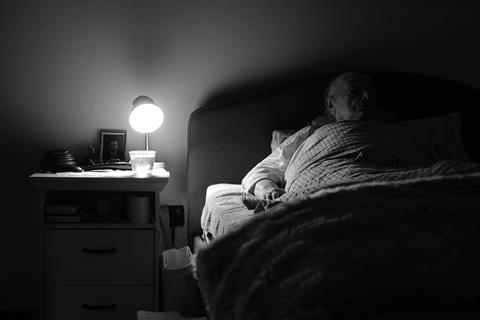Reflecting on his final months with a terminally ill friend, Jamie Gillies warns that the passing of the Assisted Dying Bill would have dire consequences for society’s most vulnerable

In April, on a grey Scottish afternoon punctuated with thunderous showers, I attended the funeral of a beloved member of my church family. It wasn’t a farewell I’d been expecting to attend so soon.
He had been grappling with diabetes for years but in 2024, his health deteriorated badly. After a fall in his home, he was hospitalised for several months. From hospital, he was moved into a care home where he eventually received palliative care. He was just 67 when he died.
My friend had needed dialysis but didn’t receive it. He was also considered to be a low priority for a transplant. Looking back, it’s clear that he had been terminally ill for some time. There was no hope of recovery for him barring a transplant, and this route was closed to him.
I’ve thought about this man a lot during the ongoing debate about assisted suicide. He would have met the requirements set by both of the ‘assisted dying’ Bills. And he’s exactly the kind of person who might have opted for assisted death.
In his last months, he had to lie motionless in a hospital ward. Before this ordeal, he’d been going progressively blind. He lived alone and required regular nursing care. And because of the diabetes, he was unable to do things that once gave him joy. This pained him.
At any point, he could have heeded the nihilistic whisper – arising within himself or from outside influences – that his life no longer had any value. ‘You’re not really living anymore, are you?’, ‘You’re a burden on everyone’. ‘Just go’.
A life, vulnerable yet valued
Mercifully, my friend was supported by a loving network of people around him. Family members and friends spent time with him, reminisced with him, and brought news from home and church.
They spoke words of affirmation over him and assured him of the hope of the Christian faith: the grace of God and the promise of eternal life for all who have placed their trust in the Lord Jesus.
He was reminded of his value constantly, and he enjoyed precious moments with others right to the end.
My friend also had the benefit of a medical establishment that avowedly does not raise the option of suicide with struggling patients.
His hospital and care home were staffed by individuals who are committed to the founding principles of the NHS – protecting life and improving health – and the life-affirming values of the hospice movement whose founder Cicely Saunders said beautifully of those approaching death, “you matter because you are you, and you matter to the last moment of your life, and we will do all we can to make that life as good as we can”.
I shudder to think of the lonely, weary, and mistreated people who don’t enjoy the support and protection my friend did, who’d make the anguished choice of an ‘assisted death’ if a law was introduced.
Privileged celebrities are leading the charge for ‘assisted dying’ but they aren’t the ones who’d suffer its worst injustices. We must consider those left to languish in care homes and mouldy flats; those burdened with the injustices of poverty, past trauma, addiction, and abuse; and those who face stigma and barriers to support – the disabled and ethnic minority Britons.
Those left behind
For people in the margins of our society, assisted suicide will offer a despairing exit from a hope-drained life. There is nothing in the ‘assisted dying’ Bills being considered in the UK to prevent people choosing to die because they lack support to live. This will, inevitably, be the outcome.
I fear that many politicians, insulated from the daily experiences of marginalised people, fail to appreciate the dangers facing this group. Naive idealism and disengagement have enabled them to back ‘assisted dying’ in a kind of vacuum.
We should oppose a Kafkaesque society in which the suicides of lonely, poor, and disabled people are not seen as calamitous but permissible
A vague sense that the idea is ‘progressive’, and misleading language and emotional manipulation by campaigners, has provided a false footing for the idea. More robust moral and social reasoning has been dismissed, as has evidence from experts. For example, palliative doctors stress the efficacy and potential of conventional care.
Those most ideologically wedded to assisted suicide elevate the principle of ‘autonomy’ above all other considerations. They believe that death by the state should be a “right” that people have.
In our therapeutic, hyper-individualist age, rights mustn’t be questioned – only extended. If a change in the law is pursued, a push to make assisted death more permissive will soon begin. Having placed a wedge in the door, campaigners will deliver hammer blow after hammer blow to break it open. The goal will be faster, less prescriptive access for more people.
The better way forward
We should oppose a Kafkaesque society in which the suicides of lonely, poor, and disabled people who lack support are not seen as calamitous but permissible – sanctioned and aided by the state.
‘Assisted dying’ is presented as a progressive change but it’s the opposite – a dangerous step backwards. There is a better, life-affirming path forwards in this area that starts with radically improved end-of-life and palliative care, and tireless suicide prevention efforts that recognise the worth and dignity of every citizen.
The Westminster Bill is en route to the Lords. It would not be unconstitutional for Peers to block a Bill that is so consequential and, in the views of people on both sides of the debate, poorly devised. Opponents will be hoping that it’s voted down and seeking to mitigate it via amendments.
The Holyrood Bill also faces an uphill struggle. Many Members of the Scottish Parliament who backed it only did so to allow for ‘more debate’, while reserving the right to vote it down later. A series of poor Bills from Holyrood in recent years provide further reasons to doubt the feasibility of this proposal.
We must pray that wisdom will prevail, and for a society that ascribes more, not less, value to human life in years to come. Politicians can still vote for that better story.






































No comments yet